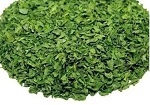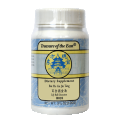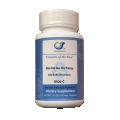|
Bai He Gu Jin Wan (Bai He Gu Jin Pian, Bai He Gu Jin Tang, Lily Bulb Formula, Lilium Teapills, 百合固金片), literally "Lily Strengthen Metal Pills" in Chinese, is a famous Chinese herbal medicine that nourishes lung Yin energy and moistens the lungs. The Chinese herb is used to manage lung discomforts such as dry cough and dry throat. |
|
Functions:
A vibrant lung function ensures that abundant oxygen is transported from the air into the bloodstream while as much as carbon dioxide is released from the blood into the air. The lung capacity or vital capacity, a measurement of strength of respiration function, starts to decline around the age of 30.
When the lung function declines, one may experience shortness of breath, lack of desire of talking and of physical strength, and pale face etc., which are indications of the Qi deficiency of the lungs in the term of traditional Chinese medicine (TCM). Another common type of lung weakness in TCM is the lung Yin deficiency, which is shown as dry cough, dry and sore throat, hot palms and soles, and night sweat etc. The cough may even come up with a trace of blood. The lung Yin may be hurt by smoking.
Bai He Gu Jin Tang is the primary Chinese herbal medicine that nourishes the Yin energy of the lungs to address the lung Yin deficiency. As the lungs are characterized as the metal in TCM, the function of the Chinese medicine is to strengthen the lung function, and Bai He, or lily, is a main Chinese herb in the herbal formula, it comes the name of Lily Strengthen Metal.
Bai He Gu Jin Wan/Pian is indicated in China Pharmacopoeia1 for nourishing Yin energy, moistening the lungs, transforming phlegm, and stopping cough. The Chinese medicine is used for Yin deficiency of both the lungs and the kidneys, dry cough with little phlegm, sputum with blood, and cough with dryness due to deficiency of yin fluid of both the lung sore throat.
• Bai He (Lily bulb) is the chief Chinese herb in the formula that nourishes the lung Yin energy and moistens the lungs. Lily also has an effect on clearing lung heat and reducing cough.
• Di Huang (Rehmannia root), used in both raw and prepared forms, is also a chief herb in the formula. The Chinese herb nourishes Yin and tonifies the kidneys. In addition, the raw Rehmannia root clears heat and generates fluids to relieve thirst. The combination of Rehmannia and Lily serves to enforce each other's function in replenishing metal (lung) and kidney (water).
• Mai Men Dong (Ophiopogon tuber) may nourish the lung Yin energy, moisten the lungs, and clear the lung heat and thus enhances the action of Lily.
• Xuan Shen (Scrophularia root) nourishes Yin and reduces Fire and assists the action of Rehmannia.
• Bei Mu (Fritillaria bulb) stops coughing, transforms phlegm, and moistens the lungs.
• Jie Geng (Platycodon root) ventilates the lung and clears phlegm. The Chinese herb can be used for coughs caused by various reasons.
• Gan Cao (Licorice root) The Chinese herb moistens the lung, relieves cough and transforms phlegm. It is often combined with platycodon root to clear phlegm and relieve sore throat.
• Dang Gui (Angelica root) and Bai Shao (Peony root) nourishes the blood to benefit the Yin energy.
Bai He Gu Jin Tang is reported beneficial to collapsed lung (spontaneous pneumothorax). In a study of 15 cases of spontaneous pneumothorax, patients treated with Bai He Gu Jin Tang for 30 to 40 days in addition to the standard western medication regimen have the hospitalization time shortened to 18.93 days from 27.85 days (P<0.05).2
|
|
Use Discretion:
Bai He Gu Jin Wan is for dry cough with little phlegm. The cough may come with hectic fever, heat sensation in the palm of your hands, sweating, and thirsty mouth. We have an array of Chinese medicines for cough.
|
|
Cautious Notes:
1. Avoid alcohol, cigarette, spicy food while taking the product.
2. Not suitable to cough due to a cold and with stuffy or running nose.
3. Not suitable for use if phlegm is excessive and thick.
4. Not suitable for use if you have digestion disorders.
5. Consult your herbalist or physician before use if you are taking other medicines.
6. Consult your herbalist or physician before use if you are children, old or very weak.
7. Only to be used by children under adult's direction.
8. Keep out of reach of children.
* These statements have not been evaluated by the Food and Drug Administration. These products and statements are not intended to diagnose, treat, cure or prevent disease. This information is provided to assist trained practitioners of traditional Chinese medicine with selection of products. If you are not familiar with these formulas or concepts please consult a licensed practitioner of Chinese herbal medicine and/or more in-depth reference materials. |












